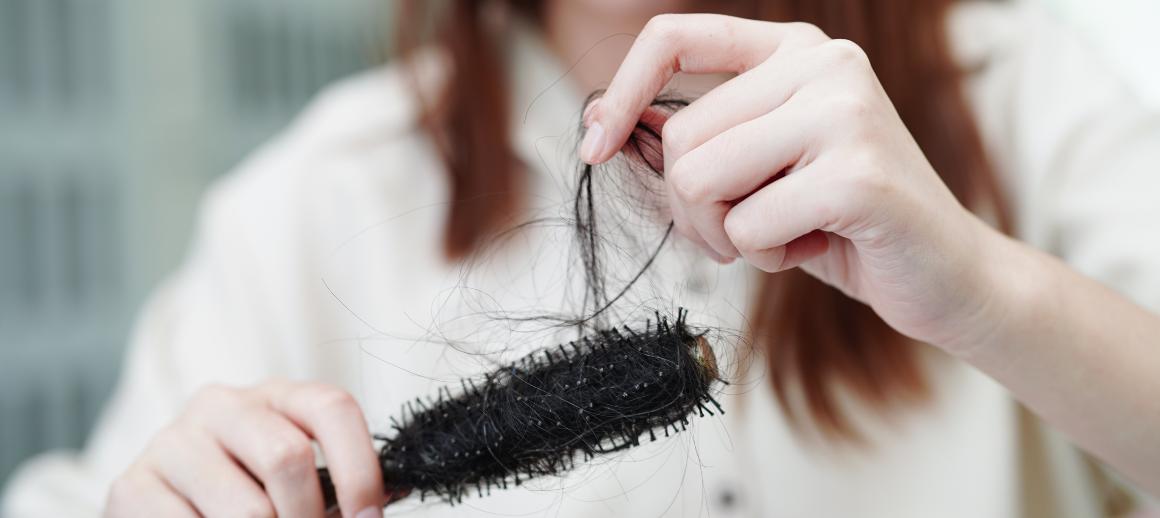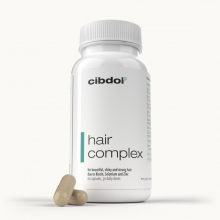Malnutrition can lead to hair loss - But it's often reversible with proper nutrition
Published:
Malnutrition and nutritional deficiencies are common causes of hair loss that are often overlooked. However, with the right nutrients and diet, hair loss due to malnutrition can be reversed.
Contents:
- What is Malnutrition and How Does it Cause Hair Loss?
- Can Hair Loss From Malnutrition Be Reversed?
-
Questions Answered About Hair Loss from Malnutrition
- What nutrient deficiencies most often cause hair loss?
- Does hair grow back after malnutrition is treated?
- Can gaining weight help restore hair?
- Do hair growth supplements work?
- What foods promote hair growth?
- Will my hair go back to normal thickness?
- How long does it take to replenish nutrients?
- Is there a blood test for nutritional deficiency hair loss?
- What diseases cause malnutrition hair loss?
- Can nutrient deficiencies cause permanent hair loss?
- A Healthy Diet and Lifestyle is Key for Preventing Hair Loss
- Can malnutrition cause hair loss?
- Is hair loss due to malnutrition reversible?
- Which nutrients are important for maintaining healthy hair?
- What are the symptoms of malnutrition in adults?
- Can malnutrition also cause problems with the scalp?
- Can nutritional supplements help in improving hair health?
- Can malnutrition be a cause behind hair transplant failure?
- Are there any specific diets that can prevent further hair loss?
- Can malnutrition lead to androgenetic alopecia?
- What role do micronutrients play in hair health?

What is Malnutrition and How Does it Cause Hair Loss?
Malnutrition refers to the lack of proper nutrition due to inadequate food intake or problems with nutrient absorption. It can be caused by eating disorders, fad diets, disease, or simply not getting enough vitamins and minerals from your diet.
There are two main types of malnutrition:
- Marasmus - caused by inadequate calorie intake which leads to severe weight loss and muscle wasting. This can occur in conditions like anorexia.
- Kwashiorkor - caused by severe protein deficiency, even if calorie intake is adequate. Causes swelling of the body from fluid retention. More common in developing countries.
Both types of malnutrition deprive the hair follicles of the essential nutrients they need for healthy hair growth. Some key ways malnutrition leads to hair loss include:
- Protein deficiency - Hair is made mostly of a protein called keratin. Without adequate protein from foods like meats, dairy, beans and lentils, new hair growth is impaired.
- Iron deficiency - Iron carries oxygen to the hair follicles. Low iron levels lead to decreased oxygen supply, inhibiting hair growth.
- Zinc deficiency - Zinc is required for protein synthesis and cell division involved in making new hair. Low zinc has been linked to hair thinning and loss.
- Vitamin deficiencies - Vitamins like A, B, C, D, and E all help support healthy hair. Deficiencies hinder the hair growth cycle.
- Malabsorption issues - Diseases like Crohn's and celiac disease make it hard to properly absorb nutrients, resulting in deficiencies.
- Crash diets - Very low calorie diets shock the body and deprive hair follicles of necessary energy and nutrients for growth.
The end result is increased hair shedding, thinning, and impaired regrowth. For malnourished individuals, up to 30% of scalp hairs may be in the resting phase instead of actively growing.
Can Hair Loss From Malnutrition Be Reversed?
The good news is that in most cases, hair loss and thinning resulting from malnutrition is reversible once the nutrient deficiencies are corrected.
Getting adequate protein, vitamins, minerals, and calories allows the hair to return to its normal growth phases. However, it can take time to undo the damage, with noticeable improvement taking 3-6 months. Here are some tips to help restore hair growth:
1. Eat a Balanced, Nutritious Diet
Make sure to meet daily needs for calories, protein, iron, zinc and vitamins through a varied diet. Good protein sources include meat, poultry, fish, eggs, dairy, beans, nuts and seeds. Get iron from red meats, seafood, spinach and fortified grains. Zinc is high in oysters, nuts, red meat and poultry. Fruits and vegetables provide essential hair vitamins.
2. Ask Your Doctor About Supplements
You may need vitamin or mineral supplements to correct any deficiencies. A supplement with Vitamin D, iron, folic acid, zinc and Vitamin B complex can give hair the nutrients it needs. Check with your doctor first.
3. Treat Any Underlying Medical Conditions
Manage diseases like anemia, thyroid disorders and autoimmune diseases, which can lead to nutrient malabsorption and hair loss. Getting these under control can reverse hair loss.
4. Avoid Crash Diets and Rapid Weight Loss
Restricting calories or nutrients causes stress that leads to excessive hair shedding. Aim for slow, steady weight loss instead through a balanced deficit. Crash dieting may be a cause of temporary hair loss.
5. Reduce Stress
Chronic stress increases cortisol and inflammation, which can exacerbate hair loss. Try relaxing activities like yoga, meditation or massage to support hair growth.
10 Questions Answered About Hair Loss from Malnutrition
There are still many common questions surrounding hair loss that results from poor nutrition. Here are answers to 10 frequently asked questions:
1. What nutrient deficiencies most often cause hair loss?
Iron and zinc deficiency are most highly linked to hair loss. Other common deficiencies include protein, vitamin D, vitamin B12, and omega-3 fatty acids. Even multiple minor vitamin/mineral deficits can add up to impact hair health.
2. Does hair grow back after malnutrition is treated?
Most cases of nutrient deficiency hair loss are reversible. However, it takes time for new hair to grow in and replace shed hairs. You may not see significant re-growth for 3-6 months. Manage expectations and be patient.
3. Can gaining weight help restore hair?
If weight loss was rapid due to malnutrition, getting back to a healthy stable weight can definitely help hair regrow. Make sure to gain weight slowly using a balanced nutritious diet. Avoid yo-yo dieting.
4. Do hair growth supplements work?
Supplements designed for hair provide the vitamins, minerals, and nutrients your locks need. Look for ones with biotin, zinc, folic acid, iron and vitamin D for deficient diets. They can support hair regrowth when combined with a healthy diet.
5. What foods promote hair growth?
Salmon, walnuts, beans, eggs, spinach, and fruits like avocados and oranges provide the proteins, omega-3s, iron, zinc, and vitamins for healthy hair. A balanced diet with these foods can optimize hair growth.
6. Will my hair go back to normal thickness?
For temporary hair thinning from short-term malnutrition, your hair can return to its former thickness once nutrients are replenished and new growth comes in. In cases of prolonged deficiency, regrowth may be less robust.
7. How long does it take to replenish nutrients?
It takes weeks to months to restore nutrient levels in your body with a healthy diet. Take supplements to help ramp up faster. You’ll also need to allow 3-6 months of new growth for optimal hair thickness. Have patience.
8. Is there a blood test for nutritional deficiency hair loss?
Your doctor can order lab tests to check for vitamin, mineral and protein deficiencies linked to hair loss. Key things to test are iron, ferritin, vitamin D, zinc and protein levels. This helps create a targeted treatment plan.
9. What diseases cause malnutrition hair loss?
Malabsorption disorders like celiac and Crohn’s disease can lead to deficiencies. Autoimmune diseases, thyroid disorders, eating disorders, GI surgery and even diabetes can also indirectly cause malnutrition hair loss.
10. Can nutrient deficiencies cause permanent hair loss?
If nutritional deficiencies are severe and prolonged, it can impair hair follicles to the point of permanent damage and hair loss. The sooner you treat it, the better the chances for recovery. Rapid intervention is key.
A Healthy Diet and Lifestyle is Key for Preventing Hair Loss
The takeaway is that many cases of hair thinning and loss can be traced back to nutritional deficiencies from malnutrition. While crash dieting may be tempting for fast results, it can deprive your hair of the essential building blocks it needs.
Getting sufficient protein, vitamins and minerals through a varied, balanced diet is key to keeping hair follicles happy and productive. Manage stress, get regular exercise, stay hydrated, and avoid nutritional extremes. Your hair will thank you by staying lush and strong for years to come!
In summary, key points to remember:
- Malnutrition from inadequate protein, calories, vitamins and minerals is a common reversible cause of hair loss.
- Marasmus and kwashiorkor are severe forms of malnutrition linked to hair loss. Deficiencies in iron, zinc, protein and vitamins typically underlie hair shedding.
- Reversing nutrient deficiencies can restore hair growth in 3-6 months. Eat a nutritious diet and take supplements if needed.
- Gain weight slowly if loss was rapid. Treat underlying digestive disorders and reduce stress for optimal hair regrowth.
- Hair may not return to its former thickness if malnutrition was severe and prolonged. Seek treatment ASAP.
- Prevent hair loss in the future through a balanced diet with ample proteins, vitamins and minerals. Stay away from crash dieting.
Can malnutrition cause hair loss?
Yes, malnutrition can lead to hair loss. When there is a deficiency of essential nutrients in the body, it can affect the health of the hair follicles and result in hair loss.
Is hair loss due to malnutrition reversible?
In many cases, hair loss caused by malnutrition is reversible. By providing the body with proper nutrition and addressing nutrient deficiencies, hair loss can be stopped and hair regrowth can occur.
Which nutrients are important for maintaining healthy hair?
Several nutrients play a role in hair health, including vitamin C, vitamin E, zinc, and vitamin D. These nutrients are essential for maintaining healthy hair follicles and promoting hair growth.
What are the symptoms of malnutrition in adults?
Symptoms of malnutrition in adults can vary, but may include sudden weight loss, brittle hair, hair thinning and hair loss, and overall weakness.
Can malnutrition also cause problems with the scalp?
Yes, malnutrition can affect the health of the scalp as well. Nutrient deficiencies can lead to dryness, itchiness, and other scalp issues.
Can nutritional supplements help in improving hair health?
Nutritional supplements can be beneficial in improving hair health, especially when there are nutrient deficiencies. However, it is important to consult with a healthcare professional before starting any supplements.
Can malnutrition be a cause behind hair transplant failure?
Yes, malnutrition can potentially affect the success of a hair transplant. Proper nutrition is essential for the healing process and the growth of transplanted hair follicles.
Are there any specific diets that can prevent further hair loss?
While there are no specific diets that can guarantee the prevention of further hair loss, a well-balanced diet rich in essential nutrients can support hair health and minimize the risk of hair loss.
Can malnutrition lead to androgenetic alopecia?
Malnutrition alone may not directly cause androgenetic alopecia (also known as pattern baldness), but it can contribute to hair thinning and hair loss in individuals already prone to this condition.
What role do micronutrients play in hair health?
Micronutrients, such as vitamins and minerals, play a crucial role in maintaining healthy hair follicles and promoting hair growth. Deficiencies in micronutrients can lead to hair problems, including hair loss.















